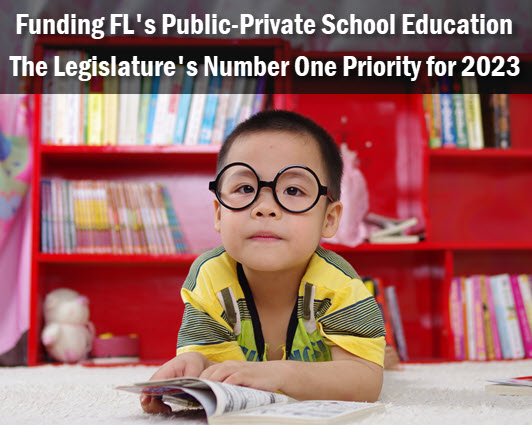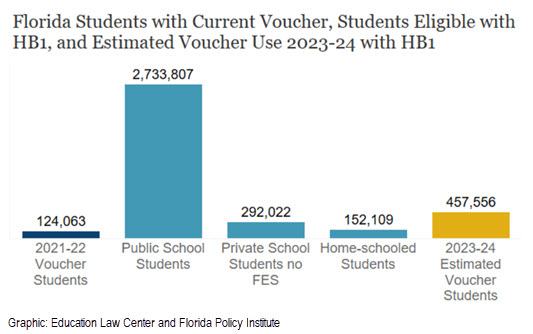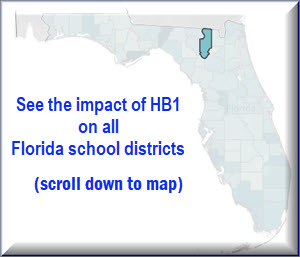Florida’s School Voucher Program: New Proposed Legislation (HB 1) Would Funnel Billions From Florida's Public Schools
Posted February 3, 2023 01:15 pm

COLUMBIA COUNTY, FL – Florida's proposed HB 1 would implement a massive expansion in Florida's public school voucher program. It would broaden eligibility to include all K-12 students statewide and redirect billions in state school aid from public to private schools.
Newly eligible for vouchers would be high-income families, current private school students, and homeschooled students.

The Florida Policy Institute (FPI) and the Educational Law Center (ELC) estimate that Florida Empowerment Scholarship (FES) vouchers would cost the state about $4 billion in the initial year of HB-1 implementation. This does not include costs for the proposed expansion of the Florida tax credit scholarship vouchers ($568 million in 2021-22).
Of the 50 states and the District of Columbia, Florida is 49th on the list of the least spent per student on K-12 public school education.
School Vouchers: Where did they come from? What Are They?
Vouchers were first created after the Supreme Court banned school segregation in 1954. School districts used vouchers to enable white students to attend private schools, which limited admission based on race. Schools that served white students were closed, and schools that served black students remained chronically underfunded.
Vouchers are any form of public payment to help parents send their children to private schools, including religious schools. They may take the form of direct government payments to parents, tax credits parents can take for tuition payments, or "fellowships" from nonprofit organizations that received donations for which the donors, in return, received a tax credit. These programs frequently support private schools that may discriminate against students and their families and do not necessarily subsidize the full cost of private education for those students who are accepted.
Other terms for vouchers are "personalized learning," "opportunity scholarships," and "parental choice."
Estimated Costs for HB 1 Are Billions
FPI and ELC estimate the costs of HB 1:
• $1.1 billion for 124,063 students currently receiving FES vouchers;
• $890 million for 104,477 new FES vouchers for current public school students once the family income cap is lifted;
• $1.9 billion for 219,017 new FES vouchers for current private school students newly eligible for vouchers; and
• $85 million for 10,000 new FES vouchers for homeschooled students newly eligible for vouchers.
FES vouchers are funded by rerouting state education funding from a student’s resident school district to cover the voucher. The money is paid directly to the private school.
 Current
private and homeschooled students are not
included in district enrollment totals.
Approximately $2 billion in new state
funding would be required to fund vouchers
for these students. If the state does not
increase revenue to cover the costs of
students already in private education, the
reallocation of state aid to vouchers will
leave school districts with significantly
less revenue to fund the remaining public
school students.
Current
private and homeschooled students are not
included in district enrollment totals.
Approximately $2 billion in new state
funding would be required to fund vouchers
for these students. If the state does not
increase revenue to cover the costs of
students already in private education, the
reallocation of state aid to vouchers will
leave school districts with significantly
less revenue to fund the remaining public
school students.
Norín Dollard, Ph.D., senior policy analyst and KIDS COUNT director at Florida Policy Institute, said, “It’s important to grasp the sheer size of this proposed expansion. If HB 1 is signed into law, the funding needed to support it will exceed the Hillsborough County school district's budget, and there would be more voucher scholarships than students in Hillsborough public schools, which comprise one of the largest school districts in the nation."
The Hillsborough County Public schools contain 303 schools and 219,000 students.
Mary McKillip, Education Law Center senior researcher, said, "It is crucial for Florida lawmakers to understand what HB-1 is set up to do to the public schools and students in their districts. Our data are estimates, and costs could potentially go much higher. Florida is on the precipice of a devastating attack on the public schools."
Over the last decade, the number of private schools in Florida has grown by 30 percent, in contrast to national trends, which saw a 9 percent decline.
--------------------------------------------
The Florida Policy Institute is an independent, nonpartisan, and nonprofit organization dedicated to advancing state policies and budgets that improve the economic mobility and quality of life for all Floridians.
The Education Law Center pursues education justice and equity to ensure that all students receive a high-quality public education.
